|
|
THE ROLE OF BLACK SOLDIERS
by James I. Robertson, Jr.
Just as the black man played a central part in causing the Civil War,
so did he play a major role in determining its outcome.
An Illinois soldier wrote of sentiments in 1861: "If the Negro was
thought of at all, it was only as the firebrand that had caused the
conflagration—the accursed that had created enmity and bitterness
between the two sections, and excited the fratricidal strife." Quite in
contrast was the observation of Pennsylvania soldier Oliver Norton.
Writing from Virginia in January, 1862, Norton stated: "I thought I
hated slavery as much as possible before I came here, but here, where I
can see some of its workings, I am more than ever convinced of the
cruelty and inhumanity of the system. It has not one redeeming
feature."
The idea among Union officials of using former slaves as soldiers
evolved slowly. It developed through stepping stones of hostility,
discrimination, and tragedy. Federal authorities had little objection to employing
blacks as army laborers, but Northern sentiment was widespread that arming
blacks would be degrading for the country. Others feared that
mobilization would invite insurrection. Many Northeners agreed with
Southern slave-holders: blacks were inferior beings incapable of
fighting with the intensity and courage of white men.
Abolitionists, patriots, and humanitarians saw compelling reasons
for placing blacks in uniform. Their numbers would add tremendous
strength to Federal forces; their presence would give new meaning to the
concept of American democracy; military service, from the blacks' point
of view, would prepare and justify them for full admission into postwar
society.
When Abraham Lincoln's Emancipation Proclamation went into effect on
January 1, 1863, it opened the door for the formal recruitment of black
soldiers. Progress was slow because of reluctance on the part of large
numbers of Union officials. Not until high-ranking Federal commanders
underwent a change of attitude did the program gain momentum.
For example, in the summer of 1863, General U.S. Grant had seen enough
to write Lincoln: "By arming the negro we have added a powerful ally. They will make good
soldiers and taking them from the enemy weakens him in the same
proportion they strengthen us. I am therefore most decidedly in favor of
pushing this policy."
The most important factor in the final acceptance of blacks as
soldiers was their performance in battle. No amount of talk or
propaganda could have won the black soldier a rightful place in the
Union army. He had to achieve that place himself, soldier-fashion, in
bloody combat. This they did, and proudly.
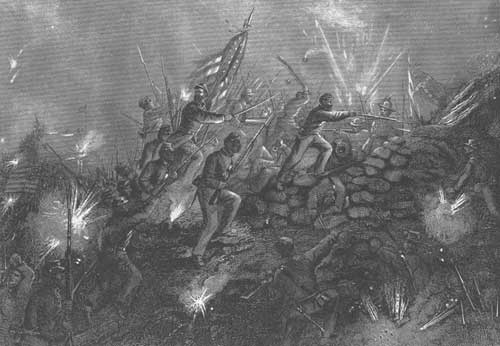
|
ATTACK ON FORT WAGNER BY THE 54TH MASSACHUSETTS, THE FIRST
BLACK REGIMENT FROM THE NORTH TO GO TO WAR. (LC)
|
In the last half of the Civil War, black troops fought in 41 major
battles and scores of minor engagements. At Fort Hudson, La., on May
27, 1863, blacks made their first formal assault of the war. Some 1,080
of them were part of an attack against a 6,000-man Confederate garrison.
The blacks did not flinch but literally threw themselves against the
enemy works. Over 300 blacks were listed among the casualties of the
unsuccessful assault. Ten days later, at Milliken's
Bend, La., the tables were reversed. Southerners assailed a position
manned by black soldiers. Some of the most vicious fighting of the war
ensued as the blacks held their lines.
Glory came to black soldiers the following month at Fort Wagner,
S.C. Close to 5,000 Federals charged across a wide expanse of open
beach against a strongly fortified position. In the forefront of the
attack was the 54th Massachusetts, the first black regiment from the
North to go to war. This unit had been struggling through tangled
marshland for two days, in pouring rain and without food. Yet it surged
forward heroically at Fort Wagner; in the illfated attack the blacks
lost 100 killed, 145 wounded, and 100 captured. The Atlantic
Monthly later declared: "Through the cannon smoke of that dark
night, the manhood of the colored race shines before many eyes that
would not see."
Throughout the Civil War, black soldiers had to weather a host of
discriminations. The Confederacy initially refused to grant them the
rights and privileges accorded to white Billy Yanks seized in battle.
For most of their Civil War service, blacks received only half the pay
of whites. They served in completely segregated regiments and, with rare
exceptions, were led by white officers. The worst duties in camp and
field customarily went to black commands. Their uniforms and equipment
as often as not were discards and rejects.
Constant harassment from white Billy Yanks further hampered the
efforts of the blacks to attain recognition. In the summer of 1861, an
Indiana lieutenant wrote his sister: "I do not believe it right to make
soldiers of them and class & rank them with our white soldiers.... I
do despise them, and the more I see of them, the more I am against the
whole black race." A New York soldier once made the terse comment: "I
think the best way to settle the question of what to do with the darkies
would be to shoot them."

|
BLACK TROOPS LIBERATE SLAVES IN NORTH CAROLINA. WOODCUT FROM
HARPER'S WEEKLY, JANUARY 1864. (LC)
|
Many of those feelings never ameliorated, but the majority of them
did. After the bloody 1864 battle of Nashville, Union General George
H. Thomas looked at the battlefield strewn with bodies and exclaimed:
"Gentlemen, the question is settled. Negroes will fight."
A total of about 179,000 blacks served as soldiers in the Civil War
and later on the western frontier. They were organized into 120 infantry
regiments, 22 artillery batteries, and 7 cavalry regiments.
Cumulative losses in black units in the 1860s and 1870s were unusually
high: 68,200—more than a third of the total enrolled. Of that
number, 2,750 were killed in action; the remaining 65,450 perished from
wounds and sickness. The number of desertions among black troops was
about 7% of the total in the army. Twenty-one blacks received the
Congressional Medal of Honor for gallantry in action.
In 1892, Colonel Norwood P. Hall of the 55th Massachusetts (Colored) Regiment proudly
stated of his men: "We called upon them in the day of our trial, when
volunteering had ceased, when the draft was a partial failure, and the
bounty system a senseless extravagance. They were ineligible for
promotion, they were not to be treated as prisoners of war. Nothing was
definite except that they could be shot or hanged as soldiers. Fortunate
it is for [the nation], as well as for them, that they were equal to the
crisis; that the grand historic moment which comes to a race only once
in many centuries came to them, and that they recognized it ..."
|
The pronounced individualism of American generations during that era
explains in great part the disrespect for authority so commonplace in
the armies. Southerners and Northerners who answered the call to arms
were products of a new nation dedicated to the ideal that one man was as
good as another; and when many of the officers showed themselves to be
at least as inexperienced as the men they were supposed to be leading,
soldiers in the ranks reacted in disgust.
These were civilian armies, formed hastily by the first fires of
war. Most of the men in a company had been lifelong acquaintances.
Before entering the army, they had addressed one another as John, Tom,
or Harry; but once in military service, several of their friends became
their superior officers. Men who had never so much as doffed their hats
at one another now found themselves obligated to salute each other and
to obey orders without question. Relinquishing friendly informality for
stuffy formality taxed the tempers of more than one private.
A North Carolinian pointedly explained the situation in his company:
"The rank and file of the Anson Guards
were the equals, and superiors to some of their officers; socially, in
wealth, in position and in education, and it was a hard lesson to learn
respectful obedience." In other words, the average soldier was willing
to obey all orders that were sensible, provided the man giving them did
not get too puffed up about it.
Verbal attacks on officers were frequent and involved the use of
such references as "whorehouse pimp," "a vain, stuck-up, illiterate
ass," "a whining methodist class leader," and one of the most classic
of all time: "a God damned fussy old pisspot." Yet the phrase that got the most
men hauled before a military court was the time-honored "son of a bitch."

|
AN UNIDENTIFIED OFFICER (LEFT) POSES WITH AN ENLISTED MAN
(COURTESY OF DENNIS KEESEE)
|

|
PICTURED L-R: UNIDENTIFIED CAPTAIN'S COOK, CAPTAIN LOUIS HILLEBRAND, AND
1ST SERGEANT W. R. PEDDLE OF THE 23RD PENNSYLVANIA.(USAMHI)
|
A Southerner once classified his colonel as "an ignoramus fit for
nothing higher than the cultivation of corn." One soldier from Florida
was convinced that all officers were "not fit to tote guts to a bear.""
Billy Yanks shared such feelings. "The officers," one Massachusetts
soldier asserted, "consider themselves as made of a different material
from the low fellows in the ranks....They get all the glory and most of
the pay and don't earn ten cents apiece on the dollar the drunken
rascals."
When a thoroughly disliked general succumbed to illness early in
1865, one of his men wrote home: "Old Landers is ded. . . I did not see
a tear shed but heard a great many speaches made about him such as he
was in hell pumping thunder at 3 cents a clap." Yet the choicest
denunciation of all came from an Illinois private who once intoned: "I
wish to God one half of our officers were knocked in the head by
slinging them Against A part of those still Left."
In contrast, those officers who led with gentle persuasiveness and
possessed real understanding about their men almost without exception
received obedience and respect. When widely esteemed Colonel Edward E.
Cross of the 5th New Hampshire fell mortally wounded at Gettysburg, his
last words were: "I think the boys will miss mess." They did; the
regiment was never quite the same after Cross's death.
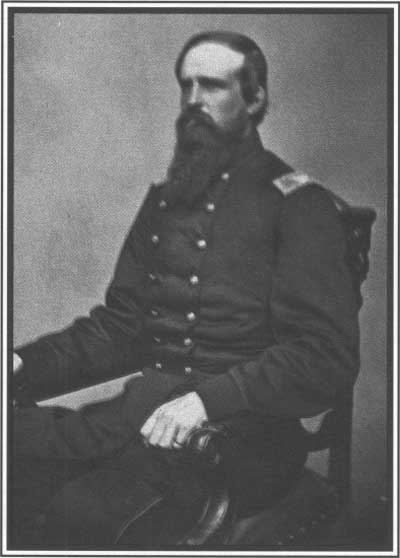
|
COLONEL EDWARD CROSS (CWL)
|
Alcohol consumption triggered the most continual misbehavior in
Civil War camps. The men drank for several reasons
and usually to excess. A Louisianian stated of a compatriot: "I never
knew before that Clarence was so much addicted to drinking. If he had
been as fond of his mother's milk, as he is of whiskey, he would have
been awful hard to wean."
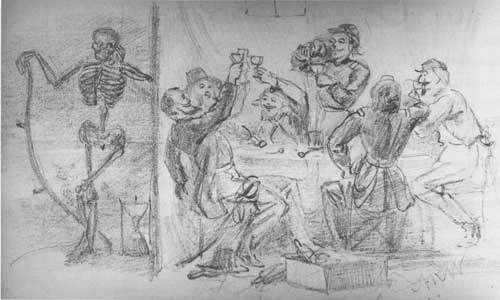
|
"HERE'S A HEALTH TO THE NEXT ONE THAT DIES." SKETCH BY
ALFRED WAUD.
|
Most of the whiskey brought or smuggled into the armies could be
classified as "mean" even for that day. A Hoosier soldier analyzed one
issue of whiskey and with a straight face adjudged it to be a
combination of "bark juice, tar-water, turpentine, brown sugar,
lamp-oil and alcohol." The potency of the liquor is readily evident
from some of the nicknames given to it: "Old Red Eye," "Rifle
Knock-Knee," "How Come You So," and "Help Me to Sleep, Mother."
The liquid surely produced some startling reactions, especially among
commanders. One night in the spring of 1861, Confederate General Arnold
Elzey and his staff engaged in a long and boisterous party. Whiskey
flowed copiously. At one point, a fairly inebriated Elzey called in the
sentry guarding his tent and kindly gave the man a drink. The revelry
eventually ran its course; Elzey collapsed in bed and fell into a deep
sleep. About dawn, he was aroused by the sentinel, who exclaimed:
"General! General! Ain't it about time for us to take another
drink?"
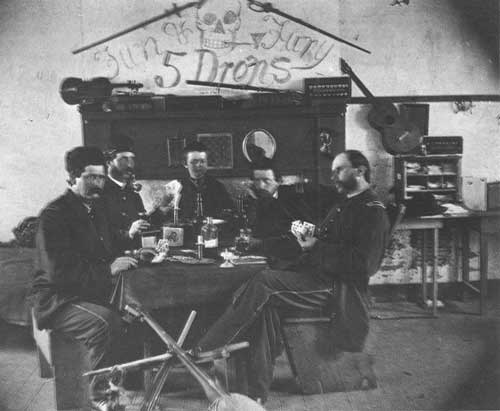
|
UNION SOLDIERS PICTURED PLAYING CARDS
AND DRINKING "OLD RED EYE." (LC)
|
In February 1864, the officers of the 126th Ohio had a farewell
party for their colonel. A bucket each of egg nog and bourbon came into
play. The result, according to a disgusted bystander, "was a big drunk,
and such a weaving, spewing, sick set of men I have not seen for many a
day... Col. Harlan was dead drunk. One Capt. who is a
Presbyterian elder at home was not much better."
The 48th New York, commanded by the Reverend James M. Perry,
was such a model of good behavior that the regiment became known as
"Perry's Saints." However, while the men were stationed at Tybee Island,
Georgia, in 1862, a large cargo of beer and wine washed ashore after a
storm. The New Yorkers proceeded to get wildly intoxicated. This spree
may have been a leading factor in Colonel Perry suffering a fatal heart
attack at his desk the following day.
On another occasion, an inebriated Union corps commander walked
straight into a tree in front of his tent, then had to be restrained
from arresting the officer of the guard on charges of felonious
assault.

|
"DRUNKEN SOLDIERS TIED UP FOR FIGHTING AND OTHER UNRULY CONDUCT."
DRAWING BY ALFRED WAUD. (LC)
|
Army punishments were imperative for the survival of discipline. Yet
the leading characteristics of Civil War punishments were inequity and
capriciousness. The frequency and degree of army sentences depended in
large measure on the whims of the commanding officer. Sometimes the most
serious offenses were all but ignored, while on other occasions trifling
offenses resulted in severe punishments.
Most penalties meted out in the army were exhibitionistic. Marching
through camp with signs denoting "Thief" or "Coward" were common
punishments. Other penalties included having to wear a barrel shirt,
dragging a ball and chain, and a painful punishment called "bucking and
gagging." After seeing a man sentenced to the last-named humiliation, a
soldier described his plight. "A bayonette or piece of wood was placed
in his mouth and a string tied behind his ears kept it in position"; then "the man was
seated on the ground with his knees drawn up to his body. A piece of
wood is run through his legs, and placing his arms under the stick on
each side of his knees, his hands are then tied in front, and he is as
secure as a trapped rat." In this posture, the culprit would undergo
excruciating pain for several hours.
Long jail terms, branding, and dishonorable discharges were
punishments generally reserved for deserters, flagrant cowards, or men
repeatedly guilty of insubordination. Far more frequently than might be
imagined was the use of capital punishment. Some 500 Civil War soldiers
went before firing squads or mounted crudely constructed gallows.
Two-thirds of that number met their deaths because of the single crime
of desertion. Executions were not merely public; they were usually
mandatory in the case of the condemned man's brigade or division.
Soldiers watching one of their number put to death for a serious offense
were not likely to commit the same offense, the thinking went.
Food was the worst problem in all Civil War armies. It produced the
most criticisms of army life. Apparently the thinking on both sides was
that if the government supplied the basic foodstuffs to the men in large
enough proportions, the troops would make out satisfactorily. Such
thinking worked out well in camp; but when the
armies were on the move, food was almost always scarce.
Every regiment in the field experienced at least one food shortage in
the course of the war, while in some military theaters famines of
lengthy duration took place.
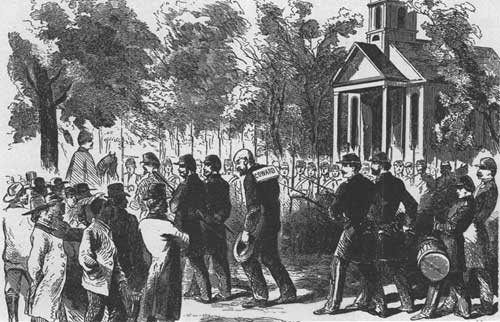
|
A COWARD IS DRUMMED FROM THE
RANKS OF THE ARMY OF THE POTOMAC. ILLUSTRATION FROM HARPER'S
WEEKLY, 1862.
|

|
FORBES DRAWING "FALL IN FOR SOUP." (LC)
|
As a rule, the rations varied from mediocre to downright repugnant.
In the autumn of 1862 an Illinois corporal informed the home folk: "The
boys say our 'grub' is enough to make a mule desert, and a hog wish he
had never been born.... Hard bread, bacon and coffee is all we
draw."
Meat was always in short supply—and that may have been good
fortune. Beef was distributed either fresh or pickled with salt. When
chewable, the fresh meat was often eaten raw because it seemed to have
more taste than when cooked.
Pennsylvania soldier John H. Markley observed in 1863 that his salted
beef ration was so strong it could almost walk its self." An Illinois
infantryman examined the meat he received on one occasion and declared
that "one can throw a piece up against a tree and it will just stick
there and quiver and twitch for all the world like one of those
blue-bellied lizards at home will do when you knock him off a fence rail
with a stick."
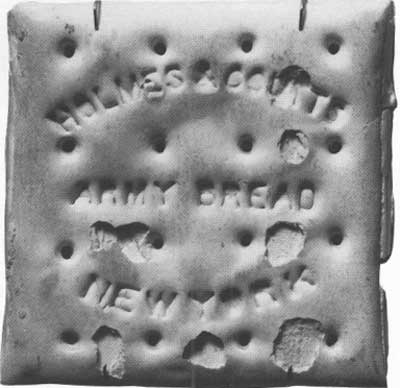
|
THE INFAMOUS CRACKER KNOWN AS HARDTACK. (COURTESY CHICAGO
HISTORICAL SOCIETY)
|
The standard bread ration in the Union armies was a
three-inch-square cracker known as hardtack. It was shipped southward in
large crates marked "B. C.," denoting Brigade Commissary. Given the
toughness of the crackers, Billy Yanks were convinced that the letters
actually stood for the date when they were baked. Worse, shipments of
these crackers were usually so infiltrated with "wigglies" that the most
prevalent nickname given to hardtack was "worm castles." One soldier
(perhaps with a degree of exaggeration) stated after the war: "All the
fresh meat we had came in the hard bread . . . and I preferring my game
cooked, used to toast my biscuits."
Civil War soldiers had wonderful powers of adaptation, but most of
them never acclimated to the quality and quantity of Civil War rations. One thoroughly
disgusted private spoke for the majority when he informed his brother:
"We live so mean here, the hard bread is all worms and the meat stinks
like hell . . . and rice two or three times a week & worms as long
as your finger. I liked rice once but god dam the stuff now."
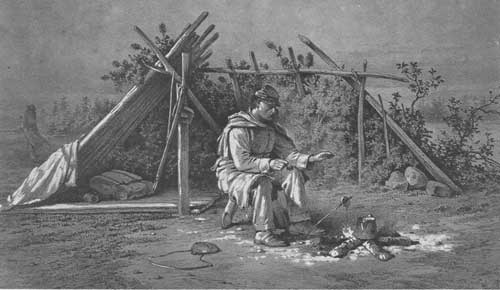
|
FORBES ILLUSTRATION "A CHRISTMAS DINNER" DEPICTS OFF-DUTY SOLDIER
COOKING HIS MEAL IN FRONT OF AN IMPROVISED SHELTER. (LC)
|
Despite such complaints, hunger was a regular companion to several
Union armies and to all Confederate forces in the field. The problem was
not in supply, for both sides had strong agricultural bases.
Transportation breakdowns, graft, corruption, and bureaucratic
incompetence blocked tons of foodstuffs from reaching the front lines.
Soldiers therefore resorted to extreme measures in an effort to calm the
gnawing emptiness in their stomachs.
Some troops were known to subsist for days on green apples and unripe
peaches taken from orchards alongside the route of a march. A South
Carolina colonel stated after the war that he "frequently saw the hungry
Confederates gather up the dirt and corn where a horse had been fed, so
that when he reached his bivouac he could wash out the dirt and gather
the few grains of corn to satisfy in part at least the cravings of
hunger. Hard, dry, parched corn . . was for many days the sole diet of
all."
A Virginian once boiled his greasy haversack in an attempt to make
soup. In 1864 a South Carolina private, overcome by what he termed his
"bold and aggressive appetite," confessed that he had "devoured the
hindquarters of a muskrat with vindictive relish, and looked with
longing eyes upon our adjutant-general's pointer dog."
|
|
